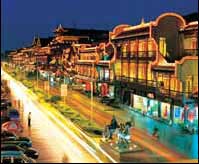
|
 |
|
Night scene in Chengdu, capital of Sichuan. |
"I am impressed with the chic commodities and cooked food," says the young consumer.
Ito-Yokado has five outlets in Chengdu whose combined sales totaled 4.8 billion yuan ($762 million) last year. It is now planning a sixth shopping center.
The first Ito-Yokado opened Chengdu in 1997 on Chunxi Road, the busiest commercial street in the southwestern city.
From its opening to the end of 2001, its annual average growth in sales was 150 percent, the highest among all 184 Ito-Yokado outlets worldwide.
Ito-Yokado's Chengdu General Manager Imai Makoto attributed the success to Sichuan's rapidly expanding economy and consumer demographics.
By 2011, Chengdu had more than 14 million people, ranking the city fourth in China. Its annual per capita urban disposable income was 23,932 yuan. Retail sales in the city surpassed 286 billion yuan for the year, up more than 18 percent over 2010.
Ito-Yokado's rapid expansion illustrates the market potential and development opportunities for Japanese retailers in western China.
Another Japanese department store chain, Mitsukoshi Isetan, has opened a facility in Chengdu, as has the Japanese convenience store chain FamilyMart. Retailer Uniqlo now has six outlets in Chengdu.
But Japanese businesses stretch far beyond retailing.
By the end of 2011, 30 Fortune 500 firms from Japan including Toyota, Mitsubishi Heavy and Kobelco had operations in Chengdu.
Japanese firms choose Sichuan for the infrastructure and reliable employees, said Kato Akio, president of the Sichuan FAW Toyota Motor Co Ltd.
|
 |
|
Sichuan, homeland of the giant panda. |
"The market of eastern China is nearly saturated and competition is very stiff," said Masahiko Goto, a former general manger at the association.
"But there is much room for development in Sichuan because of the huge western market. It is the right time for Japanese firms to come to Sichuan. If they arrive several years later, their opportunities will diminish," he said.
According to the Korea Trade Center in Chengdu, almost all large enterprises from South Korea have invested in Sichuan.
By March 2012, South Korean firms had invested $330 million in Sichuan sectors including electronic information, machine manufacturing, automobile manufacturing, food, trade and finance.
Investment by South Korean enterprises in Sichuan is less than 1 percent of their total in China, but the trade center believes much more will come due to the nation's western development strategy.